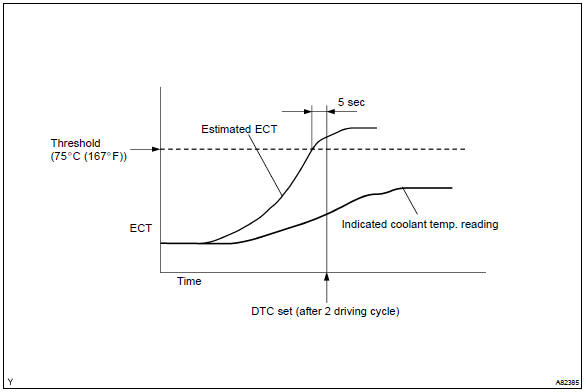Toyota Corolla (E120): Circuit description
If the engine coolant temperature (ect) does not reach 75°c (167°f) despite sufficient warm – up time has elapsed.
|
Dtc no |
Dtc detection condition |
Trouble area |
| P0128 | Condition (a), (b) and (c):
|
|
Monitor description

The ecm estimates the engine coolant temperature (ect) based on starting temperature, engine loads, and engine speeds. The ecm then compares the estimated ect with the actual ect. When the estimated ect reaches 75 c (167 f) the ecm checks the actual ect. If the actual ect is less than 75 c (167 f), the ecm will interpret this as a fault in the thermostat or engine cooling system or thermostat and set a dtc.
Monitor strategy

Typical enabling conditions

Typical malfunction thresholds

Component operating range

Monitor result (mode 06 data)

Refer to page 05–27 for the detailed information on checking monitor status.
Other materials:
Console box
Slide the lid to the rear most
position. (vehicles with a
slide function)
Lift the lid while pulling up the
knob.
■Slide function (if equipped)
The console box lid can be slid forward or backward.
WARNING
■Caution while driving
Keep the console box closed.
Injuries may result in the ev ...
If the shift lever cannot be shifted from P (except vehicles with a manual transmission)
If the shift lever cannot be shifted with your foot on the brake pedal, there
may be a problem with the shift lock system (a system to prevent accidental operation
of the shift lever). Have the vehicle inspected by your Toyota dealer immediately.
The following steps may be used as an emergency ...
Checking the messages
1 Display the “Message Inbox” screen.
2 Select the desired message from the list.
3 Check that the message is displayed.
1 E-mails: Select “Mark Unread” or “Mark Read” to mark mail unread or read on
the message inbox screen.
This function is available when “Update Message Read S ...


